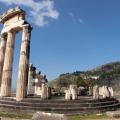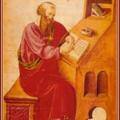81 - Jan Opsomer on Middle Platonism
Jan Opsomer helps Peter to understand principles, Plato interpretation, and Plutarch in a wide-ranging discussion of Middle Platonism.
Themes:
• J. Opsomer, In Search of the Truth: Academic Tendencies in Middle Platonism (Brussels: 1998).
• J. Opsomer, "Proclus vs Plotinus on Matter (De mal. subs. 30-7)," Phronesis 46 (2001), 154-88.
• J. Opsomer, "Plutarch's Platonism Revisited," in M. Bonazzi and V. Celluprica, L'eredità platonica (Naples: 2005).
• J. Opsomer, "Demiurges in Early Imperial Platonism," in R. Hirsch-Luipold (ed.), Gott und die Götter bei Plutarch
(Berlin: 2005).
• J. Opsomer and M. Bonazzi (eds), The origins of the Platonic system (Louvain: 2009).
• J. Opsomer, "Plutarch on the division of the soul," in R. Barney et al (eds), Plato and the Divided Self (Cambridge: 2012).







Comments
Continuity and the Sophist
It strikes me that there might be more continuity between the Platonic dialogues and the Middle Platonists on the monad and dyad than it might originally appear. This struck me because of the centrality of the forms of sameness and difference in The Sophist. It seems to me that there's a close relation (maybe even identity) between Plato's sameness and difference, and the Middle Platonists' monad and dyad. Multiplicity inevitably accompanies difference (as soon as you have a difference, you have two things, ie. a dyad), whereas oneness inevitably accompanies sameness (If "two" things are exactly the same in every respect, "they" are actually one thing). The indefinite potential series of the dyad, on which the monad intervenes to generate the specific numbers, could also be expressed as the indefinite range of possible difference, on which identity intervenes.
Of course, this is all speculative, but given what we know of Plato's interest in mathematics, it wouldn't surprise me if something like this was a genuine "unwritten doctrine" which really did go back to Plato himself.
In reply to Continuity and the Sophist by Ryan W
Middle Platonic roots
Yes, that is a good suggestion and of course scholars have thought quite a bit about potential Platonic inspiration for the Middle Platonic, Neopythagorean theories. Apart from the Sophist we could think of the mathematical cosmology of the Timaeus (which also thematizes Sameness and Difference), the Philebus (limit and unlimited), Parmenides, etc. Plus there is the information about Plato's mathematical theories in Aristotle, especially the Metaphysics, and other information on unwritten doctrines which has caused no small amount of discussion. Anyway that's all just to agree with you, however I think we have to assume that any relation between, say, 1st c BC and 1-2nd c AD century Middle Platonists and Plato himself must have been rather indirect and heavily mediated, plus rather eclectic, pulling in other ideas from Pythagoreanism and the like.
Add new comment